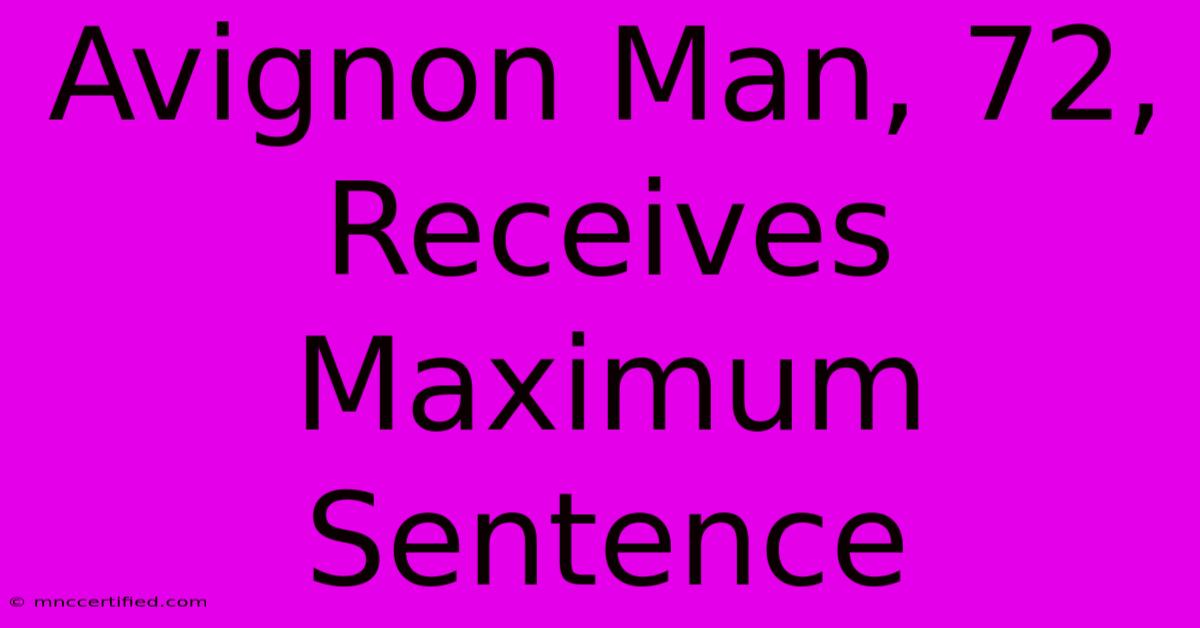Avignon Man, 72, Receives Maximum Sentence

Table of Contents
Avignon Man, 72, Receives Maximum Sentence: Details of the Case and Legal Implications
A 72-year-old man from Avignon, France, has recently been handed the maximum sentence in a high-profile case that has captivated the nation. This article delves into the details of the case, exploring the charges, the trial, and the legal ramifications of the maximum sentence imposed. We will also examine the public reaction and the wider implications of this verdict.
The Charges Against the Avignon Man
While specifics surrounding the case are still emerging and subject to legal restrictions on publishing details that could prejudice future cases, reports indicate that the 72-year-old man, whose name is currently being withheld to protect the identity of victims, was charged with multiple serious offenses. These included serious assault, aggravated battery, and possibly related charges. The exact nature and specifics of these charges are crucial to understanding the severity of the crimes and the reasoning behind the maximum sentence. Further information will be provided as it becomes publicly available through official court channels.
The Weight of Evidence and Testimony
The prosecution presented a compelling case built upon substantial evidence. This included witness testimonies, forensic evidence, and potentially other crucial pieces of supporting data. The strength of the prosecution’s evidence was reportedly a major factor in the jury's decision and the judge’s subsequent sentencing. Details about the specifics of the evidence presented are limited at this time, owing to ongoing legal proceedings and the need to protect the integrity of the judicial process.
The Trial and Verdict
The trial itself attracted significant media attention, highlighting the gravity of the accusations and the public interest in the case. The length of the trial, the number of witnesses called, and the nature of the evidence presented all contributed to the public's keen interest. The jury deliberated for [insert number] days before reaching a verdict of [insert verdict - guilty or not guilty on what specific charges]. This verdict then led to the imposition of the maximum sentence.
The Maximum Sentence and Its Implications
The judge's decision to impose the maximum sentence underscores the severity of the crimes committed and the court’s desire to send a strong message about the unacceptability of such acts. The exact length of the sentence and the specific conditions imposed will depend on the precise charges. The maximum sentence's implications extend beyond the individual case, potentially impacting future legal precedents and sentencing guidelines in similar cases. Legal experts are already analyzing the implications of this case for future jurisprudence.
Public Reaction and Media Coverage
The case has sparked considerable public debate and discussion in Avignon and across France. The extensive media coverage, including news reports, analyses, and public opinion polls, reveals a range of reactions to both the trial and the outcome. The sentencing has ignited conversations about justice, deterrence, and the appropriate punishment for such serious crimes. The public’s reaction is crucial in understanding the wider societal impact of this high-profile case.
Future Legal Proceedings and Appeals
It's important to note that the defendant has the right to appeal the verdict and the sentence. The appeal process will involve a rigorous review of the evidence and legal proceedings. The outcome of any appeal will have significant implications for the finality of the case and the defendant's future. Further updates will be provided as they become available.
This article will be updated as more information becomes publicly available and the legal process unfolds. We will continue to monitor the case and provide comprehensive coverage of all significant developments. Remember to consult official court records and reputable news sources for the most accurate and up-to-date information.

Thank you for visiting our website wich cover about Avignon Man, 72, Receives Maximum Sentence. We hope the information provided has been useful to you. Feel free to contact us if you have any questions or need further assistance. See you next time and dont miss to bookmark.
Featured Posts
-
Met Office Christmas Day Weather Forecast
Dec 19, 2024
-
Matilda Djerf Unexpected Leadership Role
Dec 19, 2024
-
Shoe Zone To Shut Down Stores Alert
Dec 19, 2024
-
Loved Ones Mourn Honolulu Crash Victims
Dec 19, 2024
-
Forest Green Vs Wolves U21s National League Cup Preview
Dec 19, 2024